- Clone
- Poly21460 (See other available formats)
- Regulatory Status
- RUO
- Other Names
- Ganglioside, GM1, ganglio-N-tetraosylceramide
- Isotype
- Rabbit Polyclonal IgG
- Ave. Rating
- Submit a Review
- Product Citations
- publications

-

C57BL/6 mouse splenocytes were stained with Ultra-LEAF™ purified anti-Asialo-GM1 (clone Poly21460), followed by anti-rabbit IgG FITC and NK1.1 PE/Cyanine7.
| Cat # | Size | Price | Quantity Check Availability | Save | ||
|---|---|---|---|---|---|---|
| 146002 | 1 mL | 428€ | ||||
GM1 is a ganglioside, a type of glycosphingolipid with a single sialic acid group. Asialo-GM1 is a GM1 derivative without a sialic acid group. It is expressed on NK cells, basophils, monocytes/macrophages, and T cells. It is particularly expressed on very early thymocytes, but the expression decreases as the cells mature and become Thy-1+. The highest expression is detected on neuronal tissues. This molecule has been shown to be involved in microbial pathogenesis. Antibodies specific for Asialo-GM1 are elevated in dementia, lupus, and Guillain-Barré syndrome.
Product DetailsProduct Details
- Verified Reactivity
- Mouse, Rat
- Antibody Type
- Polyclonal
- Host Species
- Rabbit
- Immunogen
- Asialo-GM1
- Formulation
- Lyophilized powder.
- Endotoxin Level
- Less than 0.01 EU/µg of the protein (< 0.001 ng/µg of the protein) as determined by the LAL test.
- Preparation
- Reconstitute with 1 ml sterile deionized, distilled, endotoxin-free water. Gamma globulin fraction of serum was precipitated using 50% ammonium sulfate followed by dialysis with phosphate buffered saline.
- Concentration
- Lot-specific (to obtain lot-specific concentration and expiration, please enter the lot number in our Certificate of Analysis online tool.)
- Storage & Handling
- The antibody solution should be stored undiluted between 2°C and 8°C. This Ultra-LEAF™ solution contains no preservative; handle under aseptic conditions.
- Application
-
FC - Quality tested
Depletion - Reported in the literature, not verified in house - Recommended Usage
-
Each lot of this antibody is quality control tested by immunofluorescent staining with flow cytometric analysis. Optimal staining for flow cytometry may vary from lot-to-lot. This antibody has been reported to deplete NK cells in vivo. A usage of 50 µl per mouse is recommended, but optimal usage will vary depending on the strain of mouse and experimental conditions2-4. It is recommended that the reagent be titrated for optimal performance for each application.
- Application Notes
-
This antibody recognizes asialo-GM1. It does not react with other glycolipids, such as GM1 and Asialo-GM2.
This antibody can partially block IL-12 induced IFN-γ production but does not affect other systemic action of IL-12.
This product may contain other non-IgG subtypes. -
Application References
(PubMed link indicates BioLegend citation) -
- Naiki M, et al. 1974. J. Immunol. 113:84.
- Kasai M, et al. 1981. Nature. 291:334. (Depletion)
- Nishikado H, et al. 2011. J. Immunol. 186:5766. (Depletion)
- Zhou G, et al. 2013. Eur. J. Immunol. 43:929. (Depletion)
- Product Citations
-
- RRID
-
SCR_001134 (BioLegend Cat. No. 146002)
Antigen Details
- Structure
- Asialo-GM1 is a GM1 derivative without a sialic acid group, with the structure: βDGalp(1-3)βDGalpNAc(1-4)βDGalp(1-4)βDGlcp(1-1)Cer
- Distribution
-
NK cells, basophils, splenic T lymphocytes, highest concentrations on neurons
- Function
- Supports cellular identification, neuronal plasticity, and repair mechanisms
- Interaction
- Facilitates cellular recognition and cell-to-cell communication
- Ligand/Receptor
- Ligand for cholera toxin
- Cell Type
- Basophils, Neurons, NK cells, T cells
- Biology Area
- Cell Biology, Immunology, Innate Immunity, Signal Transduction
- Antigen References
-
1. Stein-Douglas K, et al. 1979. J. Exp. Med. 143:822.
2. Kasai M, et al. 1980. Eur. J. Immunol. 10:175.
3. Young WW Jr, et al. 1980. J. Immunol. 124:199.
4. Bansal AS, et al. 1994. J. Clin. Path. 47:300. - Gene ID
- NA
- UniProt
- View information about Asialo-GM1 on UniProt.org
Related Pages & Pathways
Pages
Related FAQs
- Do you guarantee that your antibodies are totally pathogen free?
-
BioLegend does not test for pathogens in-house aside from the GoInVivo™ product line. However, upon request, this can be tested on a custom basis with an outside, independent laboratory.
- Does BioLegend test each Ultra-LEAF™ antibody by functional assay?
-
No, BioLegend does not test Ultra-LEAF™ antibodies by functional assays unless otherwise indicated. Due to the possible complexities and variations of uses of biofunctional antibodies in different assays and because of the large product portfolio, BioLegend does not currently perform functional assays as a routine QC for the antibodies. However, we do provide references in which the antibodies were used for functional assays and we do perform QC to verify the specificity and quality of the antibody based on our strict specification criteria.
- Does BioLegend test each Ultra-LEAF™ antibody for potential pathogens?
-
No, BioLegend does not test for pathogens in-house unless otherwise indicated. However, we can recommend an outside vendor to perform this testing as needed.
- Have you tested this Ultra-LEAF™ antibody for in vivo or in vitro applications?
-
We don't test our antibodies for in vivo or in vitro applications unless otherwise indicated. Depending on the product, the TDS may describe literature supporting usage of a particular product for bioassay. It may be best to further consult the literature to find clone specific information.
Other Formats
View All Asialo-GM1 Reagents Request Custom Conjugation| Description | Clone | Applications |
|---|---|---|
| Ultra-LEAF™ Purified anti-Asialo-GM1 | Poly21460 | FC,Depletion |
| Alexa Fluor® 647 anti-Asialo-GM1 | Poly21460 | FC |
| FITC anti-Asialo-GM1 | Poly21460 | FC |
| PerCP/Cyanine5.5 anti-Asialo-GM1 | Poly21460 | FC |
| PE anti-Asialo-GM1 | Poly21460 | FC |
Customers Also Purchased
Compare Data Across All Formats
This data display is provided for general comparisons between formats.
Your actual data may vary due to variations in samples, target cells, instruments and their settings, staining conditions, and other factors.
If you need assistance with selecting the best format contact our expert technical support team.
-
Ultra-LEAF™ Purified anti-Asialo-GM1

C57BL/6 mouse splenocytes were stained with Ultra-LEAF™ puri... -
Alexa Fluor® 647 anti-Asialo-GM1
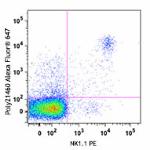
C57BL/6 mouse splenocytes were stained with NK1.1 PE and ant... -
FITC anti-Asialo-GM1
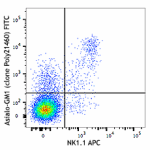
C57BL/6 mouse splenocytes were stained with NK1.1 APC and an... -
PerCP/Cyanine5.5 anti-Asialo-GM1
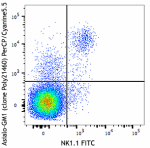
C57BL/6 mouse splenocytes were stained with NK1.1 FITC and a... -
PE anti-Asialo-GM1
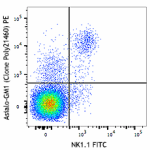
C57BL/6 mouse splenocytes were stained with NK1.1 FITC and a...

 Login / Register
Login / Register 





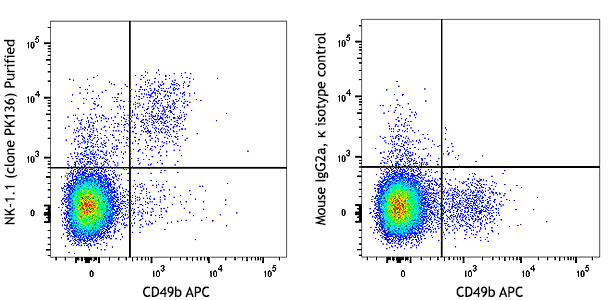
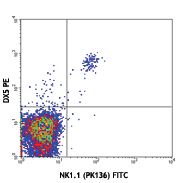
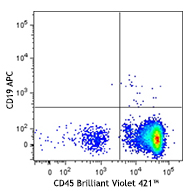
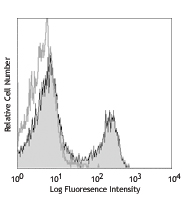



Follow Us